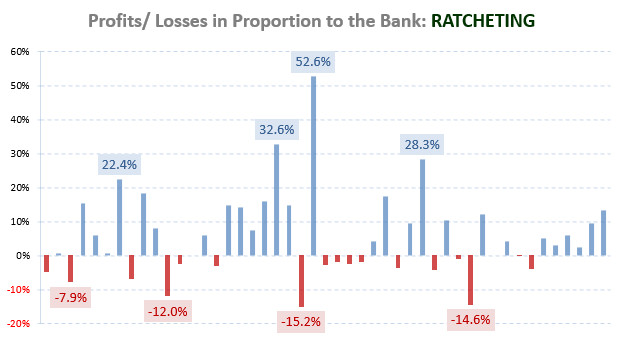
Imagine a trawler boat casting its net indiscriminately into the depths of an ocean. Although we know the fish are down there, ultimately, the only question that can ever be answered with any certainty is, “How many fish were caught?”.
We cannot say in advance with accuracy how many fish there are to catch or, after the event, how many fish were not caught…
 Image: tobkatrina (Shutterstock)
Image: tobkatrina (Shutterstock)The Mindset Required for Successful System Betting
System betting is similar to fishing with a net.
Of course, it is easy to say how many bets were won over the course of a full season (i.e. how many fish were caught).
But it is also easy to evaluate how many opportunities to win were missed (i.e. bets not placed; fish not caught).
And calculating how many winning opportunities there were in total (i.e. how many fish there were to catch) is also straightforward.
With this much control over the available information we assure you that it is possible to identify, formulate, refine, test, and finally deploy a successful betting system.
The ultimate goal of system betting is to create a strategy that becomes just a numbers exercise, and where obtaining the highest price for the desired outcome is the primary objective for achieving ‘value’ in order to gain maximum reward.
Betting is an Approximate Science
The equatorial circumference of the Earth is widely accepted as 40,075 km. However, the circumference from pole to pole is slightly less as the Earth is not exactly spherical.
Furthermore, if you were to bring into the equation all the geographical features in the path of the measuring tape and calculate the circumference including every peak and trough of every mountain and valley, then this would provide yet another different value.
But which is the correct measurement?
Let’s look at another example: Motor car producers test their vehicles and provide guarantees but occasionally they get it wrong and mass returns are ordered to rectify a common fault.
Of course, a vehicle’s longevity also depends where in the world and on which terrain it is used, how it is driven and maintained, plus a host of other immeasurable factors.
If you were to ask a vehicle manufacturer how long a particular model will last it will be impossible for him to say with any degree of accuracy, although he can predict that a rough percentage of vehicles will still be on the road in one year from now, less in two-years’ time, fewer in three-years’ time, and so on.
What we are trying to say is that too many extraneous factors prevent total accuracy with any mathematical calculation and scholars of math will readily agree that theirs is not an exact science; some allowance for error has to be accepted in any equation or calculation. (For example, the formula for Pi (Π) produces an infinitely long number, not an exact one).
Likewise, all betting strategies based on historical figures can never be 100% accurate.
Acceptable Accuracy
It is impossible to predict for sure the outcome of any one single event but it is much easier to say, for example, that between 40 and 50% of the 380 matches in league ‘X’ will be home wins next season based on the historical results in that league.
This is where system betting or ‘blanket betting’ becomes interesting.
But how do we create a strategy to catch as many of the 40-50% home wins as possible using the fewest number of wagers?
Finding a Betting System
The statistics we keep reveal that just three scorelines account for around 70% of all half-time scores. It does not matter which top-flight league you look at, the same three scores repeat themselves in more or less the same quantities per league, every season.
Can you guess what these three scorelines are before checking out this article?
Patterns such as this are ideal for planning a betting system; in fact anything you can find which happens often enough and regularly enough to warrant continual betting on the same desired outcome for consistent profits.
It goes without saying that bookmakers are not stupid and it is rare to find a result over the course of time uniformly priced in your favour.
In other words, it is hard to find an event which will be profitable when staking or risking the same amount on the same desired outcome in every match in a league during the course of an entire season. But whilst it is difficult, it is not impossible.
The Key to Unlocking the Potential of any System
When looking at system betting, we always prefer to look at the last five seasons’ results as this usually provides a sufficiently large pool of statistics to be significant. Working with too few data is more of an accuracy issue than working with too many, but five seasons’ worth is plenty/ideal.
The key to unlocking the potential of any system is your ability to filter-out matches which are statistically less likely to bring the desired outcome and, when such games are analysed collectively as a cluster, do not bring enough winning bets to make a profit.
It is clear that excluding unprofitable betting clusters such as this will increase the efficiency/profitability of any strategy.
In other words, narrow down the field to find where the majority of winning bets occur and then concentrate your strategy within this area, dispensing with the other groups of matches that are historically unprofitable.
When sorting data and filtering it, cut-off points often appear at both ends or either end of the odds spectrum. You will find that bets may become unprofitable at a certain price and lower or, at a certain price and higher, or both (and vice versa).
Filtering for Success
A good initial filter is to sort your collection of results into ascending or descending order according to the size of the home team’s odds to win.
Ultimately, you will sort the entire list of matches by as many criteria as you can think of, such as: home, away, or draw odds (or these odds converted into probability percentages – remember, this is 1 divided by the decimal odds, expressed as a percentage); desired event odds; home odds multiplied by the away odds; in fact any numerical factor you can think of to find one or more filters to discard the unprofitable matches.
In this way, filtering out undesirable matches turns system betting into a form of value betting.
Once you have filtered the entire list, it is worth looking at each individual season to see if the same elimination process works in a micro format. Paper test everything until you are happy that the system can be profitable.
The next step is to test with live events without committing money to the outcomes. Does the elimination filter or set of filters still work?
Keep observing and recording, refining and correcting, until you are happy that your system really does have a future.
Never be delusional about system or blanket betting. What works for one league several seasons in a row may fail due to an abnormal season ahead.
It is therefore important never to count on one league or one system at any one time. It is far better to spread your risk and have several systems in play at the same time. Successful system betting relies on the law of large numbers to spread risk.
The final fundamental ingredient of any betting strategy is a flexible and effective staking plan to act as the glue which holds everything together. A stop-loss (to prevent total loss of betting bank) and ratchet provision (increasing stakes incrementally) is the gloss on any staking plan.
Thus, building a solid betting system is just a series of ingredients and interconnected steps. Rather like baking a cake without a recipe; you may have to keep experimenting with the ingredients of your betting system until the end result becomes palatable.
Go Fish!
To conclude this article, we return to our earlier metaphor. (Oh my cod!).
Dip your net (i.e. your betting system) into the pool of chosen (filtered) matches.
How closely knitted the mesh of your net is will determine how many big fish (winning bets) your filter(s) will allow you to catch (win), and how many pass through the mesh of the net (the minnows, which are unprofitable to catch).
Through trial and error, adjust the size of the mesh to catch only what you want in order to achieve as many winning bets with as few wagers as possible.
Thinking along these lines will increase your chances of developing a successful strategy.
Or, why not look into our HDAFU Tables where the whole job is done and presented on a plate for you to pick systems from the leagues of your choice.
Happy fishing!






Hi friends
Please I need information where I can get 3 odds daily,either from any website or from any individual.
Thanks
Hi mate,
do you know a source where I can get historical over 2,5 goals final odds for major leagues?
Thx
Hi Manfred,
http://www.football-data.co.uk is the easiest resource = downloadable Excel sheets with Over/Under 2.5 odds. The average and maximum odds are shown under the columns located towards the far right of each sheet and entitled: BbMx>2.5; BbAv>2.5; BbMx<2.5; BbAv<2.5.
http://www.oddsportal.com provides these odds for far more leagues, but the data is far harder to collate – each price must be manually scraped from their pages.
Hope this helps!
Yes, well done Denis. The most frequent half-time scores in any league are always 0-0, 1-0 and 0-1.
I guess the 3 scores are 0-0,1-0,0-1